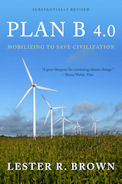 | |||||
SAVING CIVILIZATION IS NOT A SPECTATOR SPORT www.earthpolicy.org/index.php? By Lester R. Brown | Earth Policy Release Book Byte April 22, 2010 | ||||
 Given the enormous environmental and social challenges faced by our early twenty-first century global civilization, one of the questions I hear most frequently is, What can I do? People often expect me to talk about lifestyle changes, recycling newspapers, or changing light bulbs. These are essential, but they are not nearly enough. We now need to restructure the global economy, and quickly. It means becoming politically active, working for the needed changes. Saving civilization is not a spectator sport. Given the enormous environmental and social challenges faced by our early twenty-first century global civilization, one of the questions I hear most frequently is, What can I do? People often expect me to talk about lifestyle changes, recycling newspapers, or changing light bulbs. These are essential, but they are not nearly enough. We now need to restructure the global economy, and quickly. It means becoming politically active, working for the needed changes. Saving civilization is not a spectator sport. Inform yourself, read about the issues. If you want to know what happened to earlier civilizations that found themselves in environmental trouble, read Collapse by Jared Diamond or A Short History of Progress by Ronald Wright or The Collapse of Complex Societies by Joseph Tainter. My latest book, Plan B 4.0: Mobilizing to Save Civilization, can be downloaded free of charge from Earth Policy Institute's (EPI's) Web site, earthpolicy.org, along with complementary data sets and a slide show summary. If you find these materials useful in helping you think about what to do, share them with others. Pick an issue that's meaningful to you, such as tax restructuring, banning inefficient light bulbs, phasing out coal-fired power plants, or working for streets in your community that are pedestrian- and bicycle-friendly, or join a group that is working to stabilize world population. What could be more exciting and rewarding than getting personally involved in trying to save civilization? You may want to proceed on your own, but you might also want to organize a group of like-minded individuals. You might begin by talking with others to help select an issue or issues to work on. And communicate with your elected representatives on the city council or the national legislature. Aside from the particular issue that you choose to work on, there are two overriding policy challenges: restructuring taxes and reordering fiscal priorities. Write or e-mail your elected representative about the need to restructure taxes by reducing income taxes and raising environmental taxes. Remind him or her that leaving costs off the books may offer a false sense of prosperity in the short run but that it leads to collapse in the long run. Let your political representatives know that a world spending more than $1 trillion a year for military purposes is simply out of sync with reality, not responding to the most serious threats to our future. Ask them if the Plan B budget—an additional $187 billion a year for eradicating poverty, stabilizing population, and restoring the earth—is an unreasonable expenditure to save civilization. Ask them if diverting one eighth of the global military budget to saving civilization is too costly. Remind them of how the United States mobilized during World War II. And above all, don't underestimate what you can do. Anthropologist Margaret Mead once said, "Never doubt that a small group of concerned citizens can change the world. Indeed, it is the only thing that ever has." It doesn't hurt to underpin your political efforts with lifestyle changes. But remember they supplement your political action; they are not a substitute for it. Urban planner Richard Register recounts meeting a bicycle activist friend wearing a t-shirt that said "I just lost 3,500 pounds. Ask me how." When queried he said he had sold his car. Replacing a 3,500-pound car with a 22-pound bicycle obviously reduces energy use dramatically, but it also reduces materials use by 99 percent, indirectly saving still more energy. Dietary changes can also make a difference. The climate footprint differences between a diet rich in red meat and a plant-based diet is roughly the same as the climate footprint difference between driving a large fuel-guzzling SUV and a highly efficient gas-electric hybrid. Those of us with diets heavy in fat-rich livestock products can do both ourselves and civilization a favor by moving down the food chain. Beyond these rather painless often healthily beneficial lifestyle changes, we can also think about sacrifice. During World War II the military draft asked millions of young men to risk the ultimate sacrifice. But we do not need to sacrifice lives as we battle to save civilization. We are called on only to be politically active and to make lifestyle changes. During the early part of World War II President Roosevelt frequently asked Americans to adjust their lifestyles. What contributions can we make today, in time, money, or reduced consumption, to help save civilization? The choice is ours—yours and mine. We can stay with business as usual and preside over an economy that continues to destroy its natural support systems until it destroys itself, or we can adopt Plan B and be the generation that changes direction, moving the world onto a path of sustained progress. The choice will be made by our generation, but it will affect life on earth for all generations to come. # # # For more inspiration about What You Can Do, see Earth Policy Institute's Action Center. To connect with others interested in taking action, join EPI's Facebook page. Adapted from Chapter 10, "Can We Mobilize Fast Enough?" in Lester R. Brown, Plan B 4.0: Mobilizing to Save Civilization (New York: W.W. Norton & Company, 2009), available on-line at www.earthpolicy.org/index.php? Feel free to pass this information along to friends, family members, and colleagues!
| |||||
Small, easy "eco steps" we can all take to live better, be happier, save money and help the environment.
Friday, April 23, 2010
Saving Civilization is not a Spectator Sport - Lester R. Brown
Subscribe to:
Post Comments (Atom)
No comments:
Post a Comment